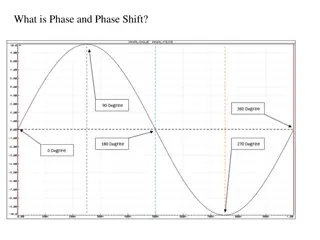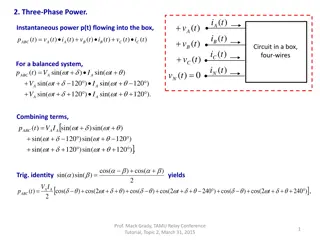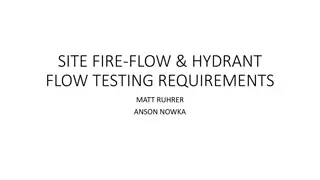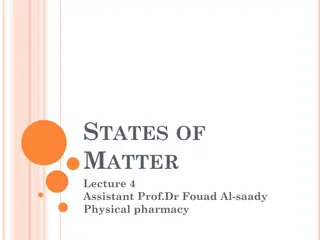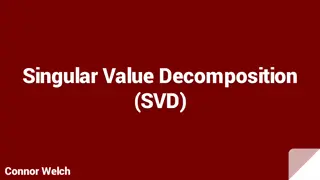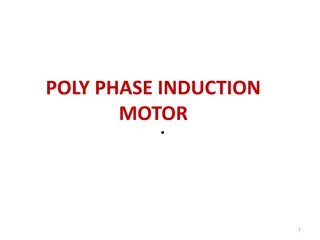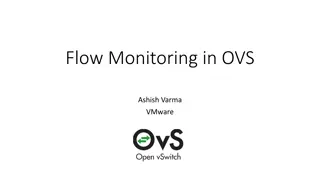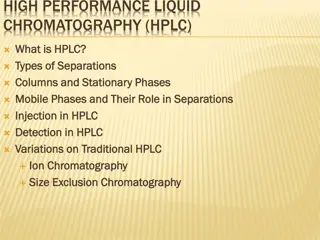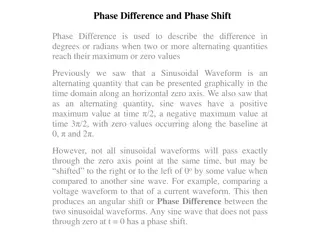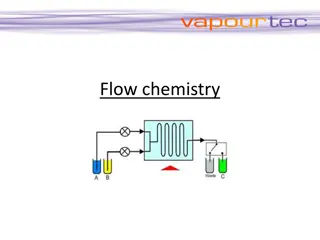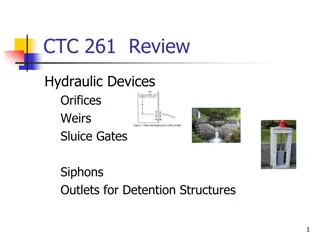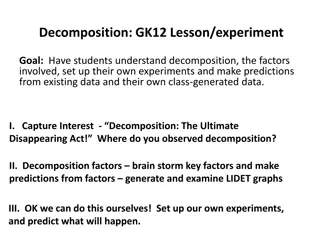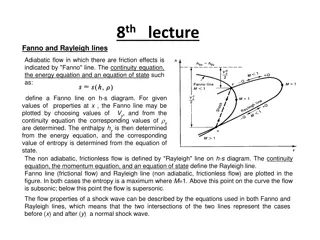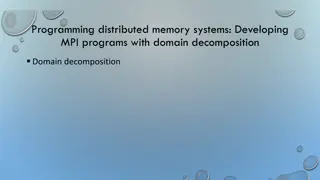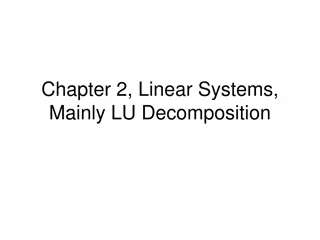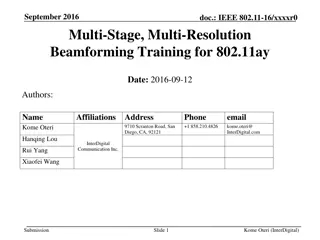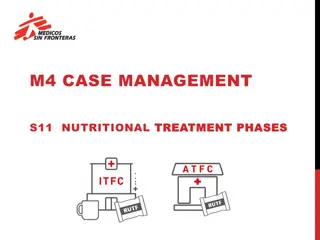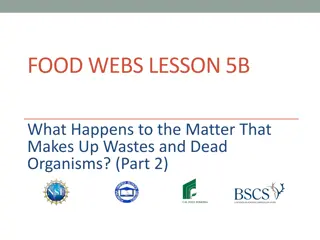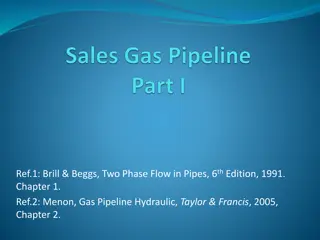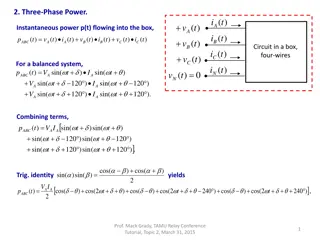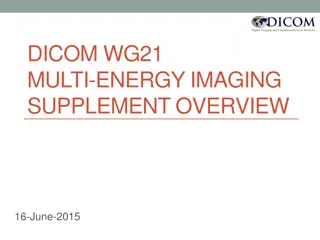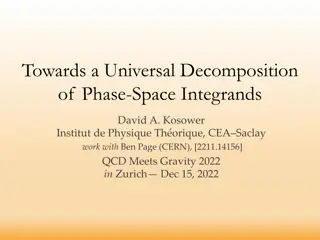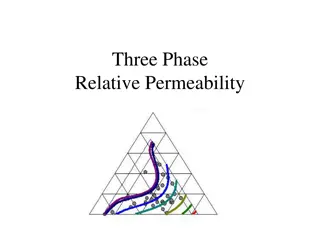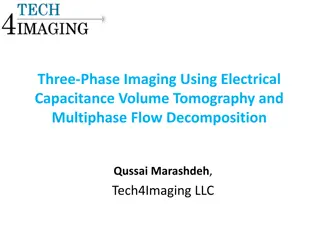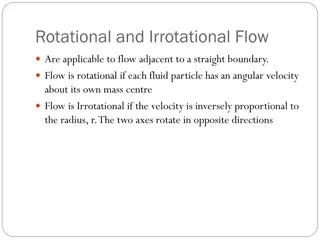Understanding RC Phase Shift Oscillators
Dive into the world of RC phase shift oscillators, exploring the concepts of phase and phase shift in electronic circuits. Learn how cascading RC networks can achieve specific phase shifts, the role of impedance, and the practical applications of RC feedback networks in oscillator circuits. Discover
1 views • 18 slides
The Psychology of Flow: Achieving Total Focus and Optimal Performance
Engage in activities for their intrinsic value, where the ego diminishes, and time seems to vanish - that's when flow occurs. This optimal psychological state involves deep concentration, clear goals, and a sense of control. By embracing challenges and staying in the present moment, one can cultivat
0 views • 13 slides
Understanding the Three Stages of Project Life Cycle
The project life cycle consists of three key stages: pre-investment phase, construction phase, and normalisation phase. The pre-investment phase involves objective formulation, demand forecasting, and cost-benefit analysis. The construction phase focuses on building project infrastructure and invest
1 views • 5 slides
Understanding Runoff in Hydrology
Runoff in hydrology refers to surface water flow from precipitation and other sources in drainage basins. It plays a crucial role in stream flow and peak flood formation, influenced by factors like overland flow, interflow, and groundwater flow. This article explores the sources of runoff, including
3 views • 27 slides
Understanding Max Flow in Network Theory
In network theory, understanding the concept of maximum flow is crucial. From finding paths to pushing flow along edges, every step contributes to maximizing the flow from a source to a target in the graph. The process involves determining capacities, creating flows, and calculating the net flow ent
2 views • 41 slides
Understanding the Power of Decomposition in Problem Solving
Learn about the concept of decomposition and its importance in problem-solving scenarios in both real-life and Computer Science. Discover how breaking down complex problems into manageable sub-problems can lead to efficient solutions. Explore how decomposition aligns with algorithmic thinking and en
1 views • 11 slides
Understanding Three-Phase Power Systems and Instantaneous Power Flow
This detailed content delves into three-phase power systems, analyzing instantaneous power flow, balanced circuits, and trigonometric calculations. It explores the concept of constant three-phase power and provides insights into the analogy of a piston engine with infinite cylinders. The data includ
2 views • 9 slides
Fire Flow Requirements and Calculation Methods
Detailed information on site fire flow and hydrant flow testing requirements, how to calculate required fire flow, applicable codes and standards including NFPA and IBC, duration of fire flow, methodologies for fire flow calculation, and ISO methods and formulas.
4 views • 30 slides
Understanding Phase Equilibria in Physical Pharmacy
Delve into the complexities of states of matter, phase equilibria, and the phase rule as explained by Assistant Prof. Dr. Fouad Al-saady in the context of physical pharmacy. Learn about phase definitions, phases in different systems, and examples illustrating phase differentiation in various substan
0 views • 22 slides
Parallel Implementation of Multivariate Empirical Mode Decomposition on GPU
Empirical Mode Decomposition (EMD) is a signal processing technique used for separating different oscillation modes in a time series signal. This paper explores the parallel implementation of Multivariate Empirical Mode Decomposition (MEMD) on GPU, discussing numerical steps, implementation details,
1 views • 15 slides
Importance of Cash Flow Analysis in Financial Management
Cash flow analysis is a crucial financial tool for effective cash management, aiding in evaluating financial policies and positions. It helps in planning, coordinating financial operations, assessing cash needs, and meeting obligations. However, it has limitations as it does not substitute the incom
1 views • 7 slides
Understanding Singular Value Decomposition (SVD)
Singular Value Decomposition (SVD) is a powerful method for solving systems of linear equations or matrices that are singular or close to singular. When LU-decomposition or Gaussian elimination fail, SVD provides a stable matrix decomposition helpful in various applications. It is particularly usefu
0 views • 17 slides
Understanding Poly Phase Induction Motor Construction
An induction motor is comprised of a stator and rotor, with the stator featuring a 3-phase winding fed from a 3-phase supply. The rotor comes in two types - squirrel-cage and phase wound. The squirrel-cage rotor consists of heavy bars tightly pressed on the shaft, while the phase wound rotor has a 3
0 views • 47 slides
Understanding Flow Monitoring in OVS for Efficient Network Management
Learn how Flow Monitoring in Open vSwitch (OVS) allows controllers to track and manage changes to flow tables, enabling efficient network management. Explore topics such as Flow Mod programming, Flow Monitor messages, OVS support, monitoring vs. snoop, and practical examples of flow monitoring in ac
0 views • 9 slides
An Overview of High Performance Liquid Chromatography (HPLC)
High Performance Liquid Chromatography (HPLC) is a powerful analytical technique used for separating and identifying compounds in a mixture. It involves a mobile phase and a stationary phase to achieve separation based on different physicochemical properties. The mobile phase plays a crucial role in
0 views • 20 slides
Understanding the Singular Value Decomposition
The Singular Value Decomposition (SVD) is a powerful factorization method for matrices, extending the concept of eigenvectors and eigenvalues to non-symmetric matrices. This decomposition allows any matrix to be expressed as the product of three matrices: two orthogonal matrices and a diagonal matri
0 views • 35 slides
Understanding the Phase Rule in Physical Pharmacy: Two Component Systems and Equilibrium Phases
The Phase Rule is essential in determining the state of a system based on components and phases. This study explores two-component systems in physical pharmacy, illustrating miscibility behaviors and equilibrium phases through diagrams and explanations. Understanding binodal curves, tie lines, and t
0 views • 12 slides
Understanding Phase Difference and Phase Shift in Sinusoidal Waveforms
Phase difference and phase shift describe the angular displacement of sinusoidal waveforms in degrees or radians. These concepts are crucial in analyzing the relationship between alternating quantities such as voltage and current. The phase angle determines the shift of a waveform along the horizont
1 views • 26 slides
Bi-Decomposition of Large Boolean Functions Using Blocking Edge Graphs
Bi-decomposition is a vital technique in logic synthesis for restructuring Boolean networks. This paper discusses the methodology of breaking down large Boolean functions using Blocking Edge Graphs (BEG) to simplify physical design and reduce complexity. The process involves constructing BEG, perfor
1 views • 29 slides
Understanding Flow Chemistry for Efficient Chemical Reactions
Flow chemistry, also known as continuous flow or plug flow chemistry, revolutionizes chemical reactions by running them in a continuous flow stream. This dynamic process offers efficient manufacturing of chemical products with precise control over critical parameters like stoichiometry, mixing, temp
2 views • 7 slides
Understanding Open Channel Flow and Mannings Equation
This review covers hydraulic devices such as orifices, weirs, sluice gates, siphons, and outlets for detention structures. It focuses on open channel flow, including uniform flow and varied flow, and explains how to use Mannings equation for calculations related to water depth, flow area, and veloci
1 views • 43 slides
Performance Aspects of Multi-link Operations in IEEE 802.11-19/1291r0
This document explores the performance aspects, benefits, and assumptions of multi-link operations in IEEE 802.11-19/1291r0. It discusses the motivation for multi-link operation in new wireless devices, potential throughput gains, classification of multi-link capabilities, and operation modes. The s
0 views • 30 slides
Understanding Decomposition: Experiments & Predictions for Students
Engage students in understanding decomposition through hands-on experiments, predictions based on factors, and analysis of data. Explore various decomposition examples, set up experiments with different variables, and analyze outcomes to enhance comprehension. Utilize resources like LIDET graphs and
0 views • 10 slides
Understanding Fanno and Rayleigh Lines in Adiabatic Flow
Fanno and Rayleigh lines on the h-s diagram help in analyzing adiabatic flow with friction effects. The Fanno line represents frictional flow, while the Rayleigh line signifies non-adiabatic, frictionless flow. These lines aid in plotting flow properties and understanding phenomena like shock waves
0 views • 6 slides
Developing MPI Programs with Domain Decomposition
Domain decomposition is a parallelization method used for developing MPI programs by partitioning the domain into portions and assigning them to different processes. Three common ways of partitioning are block, cyclic, and block-cyclic, each with its own communication requirements. Considerations fo
0 views • 19 slides
Understanding Linear Systems and LU Decomposition
Explore the fundamental concepts of linear algebra, including matrix notation, existence of solutions, vector spaces, computation tasks, and LU decomposition techniques. Learn about Gauss elimination, Crout's algorithm, and how to solve linear systems efficiently using LU decomposition.
0 views • 25 slides
Multi-Stage, Multi-Resolution Beamforming Training for IEEE 802.11ay
In September 2016, a proposal was introduced to enhance the beamforming training procedures in IEEE 802.11ay for increased efficiency and MIMO support. The proposal suggests a multi-stage, multi-resolution beamforming training framework to improve efficiency in scenarios with high-resolution beams a
0 views • 11 slides
Procedural Decomposition and Static Methods in Programming
Understanding procedural decomposition and static methods is essential in programming to reduce redundancy, organize code effectively, and manage complexity. Procedural decomposition involves dividing a problem into methods, while static methods help in code reuse and managing complexity. By designi
0 views • 18 slides
Understanding Nutritional Treatment Phases in Pediatric Malnutrition
This session covers the different phases of nutritional treatment in pediatric malnutrition programs, focusing on objectives, specifics, and criteria for transitioning between phases. An illustrative case of Annika, a 3-year-old in the Transition Phase, is provided for practical application and unde
0 views • 5 slides
Understanding Decomposition in Food Webs Lesson 5B
Explore the process of decomposition in food webs through a series of investigations involving strawberries and their decomposition process. Uncover the role of mold in decomposition, the consistency of mass despite shrinkage, and the recycling of matter in ecosystems. Engage with questions on the d
0 views • 9 slides
Comprehensive Overview of Two-Phase Flow Equations and Gas Pipeline Hydraulic Analysis
Explore the general flow equations for two-phase flow in pipes and gas pipeline hydraulics. Understand concepts such as internal energy, kinetic energy, potential energy, entropy, and friction factors. Learn about pressure gradients, Reynolds numbers, and friction factors in single-phase gas flow. G
1 views • 26 slides
Understanding Three-Phase Power Systems
This content discusses three-phase power systems, including instantaneous power flow, balanced systems, and trigonometric identities. It delves into the concept of smooth running machines in relation to three-phase power, analyzing the constant nature of instantaneous power. The analogies to a pisto
0 views • 7 slides
Overview of DICOM WG21 Multi-Energy Imaging Supplement
The DICOM WG21 Multi-Energy Imaging Supplement aims to address the challenges and opportunities in multi-energy imaging technologies, providing a comprehensive overview of imaging techniques, use cases, objectives, and potential clinical applications. The supplement discusses the definition of multi
0 views • 33 slides
Advancing Phase-Space Integrands Decomposition in Particle Physics
Towards a universal approach for disentangling complex phase-space integrands in particle collisions, researchers are exploring methods to tame jet hair, cancel divergences in observables, and develop frameworks for precise calculations at various perturbative orders. The vision includes mastering m
0 views • 19 slides
Understanding Three-Phase Relative Permeabilities in Reservoir Engineering
Explore the application, correlations, and traditional assumptions of three-phase relative permeabilities in reservoir engineering. Learn about saturation-dependencies, occupancy models, and the challenges of measuring three-phase relative permeabilities. Discover how to calculate three-phase permea
0 views • 14 slides
Understanding Microbial Growth: Phases and Dynamics
Microbial growth is defined as an increase in cellular constituents leading to a rise in microorganism size or population. The growth of bacterial cells is characterized by distinct phases such as lag phase and exponential phase. During the lag phase, cells are synthesizing new components before div
0 views • 21 slides
Understanding Bacterial Growth and Nutritional Requirements
Bacterial growth involves processes like binary fission, exponential phase, and stationary phase. Factors influencing growth include nutrient availability, oxygen levels, and toxic waste accumulation. Lag phase precedes exponential growth, where cells prepare for division. Stationary phase occurs wh
0 views • 11 slides
Advanced Imaging Techniques for Three-Phase Flows in Reactor Systems
Gas-liquid-solid reactor systems require advanced measuring techniques to understand complex three-phase flows. Multi-Phase Flow Decomposition using Electrical Capacitance Volume Tomography (ECVT) offers innovative solutions for visualizing and quantifying phase hold-up distributions and dynamic cha
0 views • 17 slides
Moving to the Design Phase: Feasibility Phase Checklist
The transition requirements for moving to the Design Phase include the Water Fund being deemed feasible, resources committed for design, and a formal decision made. The Feasibility Phase Checklist covers governance, science, finance, implementation, and communications aspects. The high-level action
0 views • 4 slides
Understanding Fluid Flow and Measurement Devices
The concept of rotational and irrotational flow adjacent to a straight boundary, along with the dynamics of fluid flows and laws governing fluid flow like the continuity equation and energy equation, are discussed. Insights into devices for flow measurement such as venturimeter, pitot tube, orifices
0 views • 4 slides
